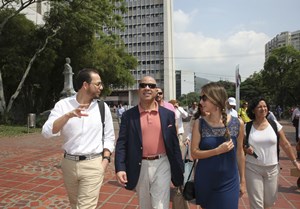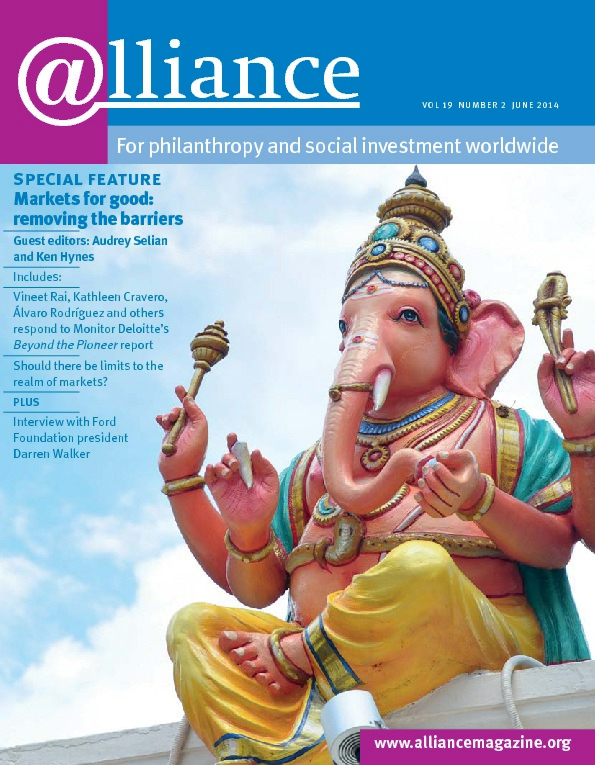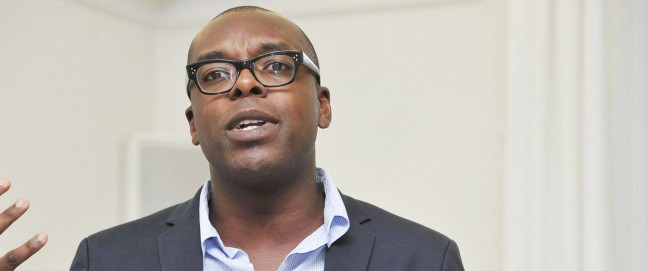‘What we have learned is that the Ford Foundation has done three things very well: building institutions, investing in people and advancing social innovation.’
The car has a new driver. Will he change direction? Will he tinker with the engine? Six months into his job as president of the Ford Foundation, Darren Walker talks to Caroline Hartnell about the experience so far and his intentions for the future of Ford under his stewardship.
What has been your highest priority in your first six months as president of the Ford Foundation?
It’s been to create a culture that is inclusive, participatory and transparent. I’ve used this idea of retooling and re-imagining our culture and our work. I’ve spent a lot of time learning from our history and listening to our grantees, both in the New York office and on site visits to the various places in the United States and the world where we work.
From that listening, have you started to formulate what your priorities are going to be?
What we have learned from this process is that the Ford Foundation has done three things very well: building institutions, investing in people and advancing social innovation. That’s what I think is our comparative advantage and what I will be affirming in the future through our work.
Do you see that as affirmation of the way things are now or does that represent some changes in direction?
I think it’s to be expected that there will be changes. Much in the world has changed over our history and the institution needs to remain dynamic and agile, committed to our history but with an eye towards the future.
Many institutions around the world owe their existence to the Ford Foundation, both through seed grants and through ongoing support. But this is often dismissed as scatter-gun funding. What are your views about institution building?
I think building institutions will look different now and into the future. In the past, we might have thought in terms of having an organizational infrastructure, with a base organization in Washington or New York. I think the future model will be ‘models’, plural, because I think today we need to think about non-traditional networks and configurations. We’ll be thinking about how we invest in new forms of institution and how we can best make a difference through these new configurations, incorporating social media etc. There is a critique of what you called scatter-shot, though I wouldn’t agree with it. I think we were doing exactly what we should have been doing. In 2014 and into the future, we will need a new modality and a new configuration of people and communities in order to effect social change.
There are very impressive institutions all over the world that Ford was involved in at the start. I’m thinking of WINGS and human rights funds in different countries. What are your feelings about these organizations?
It is deeply gratifying to travel the world and experience the impact of the Ford Foundation because there is no corner of the world where this institution’s rich history has not been felt. The organizations you mentioned will continue to be an essential part of our community of grantees. Whether it’s WINGS or other philanthropy sector organizations, we expect to continue our work with them. We’re very proud of that record.
I understand that philanthropy is likely to rise up the Ford Foundation agenda, perhaps with a particular emphasis on indigenous forms of philanthropy in emerging economies. Can you say something about this?
I think the really exciting opportunity for philanthropy is that we can play an important role as a problem solver in communities – and philanthropy is an essential ingredient for solving most social problems. We’re deeply committed to the idea of indigenous philanthropy because, in our view, to the extent that local communities can solve their own problems, the solution will be sustained. Hilary Pennington, who has recently joined us as vice president, has many years of experience in philanthropy, most recently at the Gates Foundation, and I have asked her to head up our new programme on philanthropy.
Do you have any idea what that new programme is going to look like?
Hilary and I are in the process of reviewing our past work and setting up a set of consultations with former grantees and colleagues in the field. I think the process will inform our ultimate direction, but at this time I don’t have anything specific to share.
It sounds, though, as if you’re sympathetic to the idea of supporting community philanthropy organizations?
Without making any commitments, I think philosophically we believe in the idea of community philanthropy and empowering local people to build philanthropic institutions.
And, philosophically speaking, would you see this building of local philanthropic institutions as furthering your other programme goals in these countries, whether it’s community development or other areas that you’re working in?
Yes, because our objective cannot be achieved without partnership, and so partnership and collaboration at the local level is an important part of our theory of change.
 Is it also important to support the infrastructure of philanthropy?
Is it also important to support the infrastructure of philanthropy?
I think what we have to ensure is that we support sustainable institutions and that starts by feeding ideas, by investing in early-phase development of the idea and the leadership that will drive those ideas. I was with an NGO for many years, and to my mind investing in infrastructure is the most essential part of the development of any sustainable field or movement. (Pictured: Darren Walker walking in Cali, where Ford has invested as part of its Just Cities programme.)
We’ve talked about philanthropy and institution building. Do you see any changes in programme priorities in the pipeline in other areas?
There are certainly new directions we are taking that I have signalled. For example, we have a new programme on internet rights. We have a director and we’ve hired a programme officer in that programme and they’re building a global programme on internet rights because the internet will be hugely important to social justice today and into the future. We will also be re-engaging in work that in recent years was wound down in the area of international relations and peace and security. So those are two important areas where I think there will be greater emphasis and resource allocation in the future.
You’re part of a consortium of funders in Detroit. On the one hand, it’s been praised as showing foundations are willing to take risks and be different. But there have also been criticisms that foundations are imposing conditions on others and stepping in for the state in a way that they shouldn’t be. What’s your view on that?
I think that it is certainly a bold move by the philanthropies involved. It reflects the view that we need to think in a bold and innovative way about approaches to solve big problems. It brings me back to what I said about the problem-solving approach that philanthropy needs to take in response to significant challenges. I would not put this forward as a template that when a municipality goes into bankruptcy foundations should be engaged. I would say, however, that the lesson for us from this experience has been that when you listen to local leaders and people working on the front line in a challenging context, and you listen without the kind of constraints imposed by narrow programme guidelines, and you take yourself back to your mission, great, exciting things can happen. So I think the Detroit experience has been exhilarating and exciting for us and a great learning experience.
What do you think about William Schambra’s criticism[1] of foundations’ ‘insistence that the funds will not be forthcoming unless a broad range of private and public institutions meet certain conditions’?
Foundations should certainly be thoughtful and considerate whenever we are engaged with grantees and in our problem-solving approach. However, we have a responsibility to ensure that our grant dollars are used fully for charitable purposes and we have a responsibility to ensure that the governance of those dollars is considered and adhered to over the life of the grant. For some of the philanthropies involved, these are 20-year grants so it is appropriate that there be reasonable conditions associated with it, just as there are in one-year grants. I think there are always going to be conditions that come with a grant.
You’ve mentioned the internet rights programme and you’ve talked about social media and new ways of connecting. Can you say a bit more about your vision for technology in the Ford Foundation?
In many ways, technology is having a transformative impact on the world and the implications for social justice are huge. This includes everything from privacy and personal rights to big data, net neutrality and access to the internet – a host of important issues embedded here that we are interested in working on because they have significant consequences for individual and community rights and fundamental notions of freedom and justice.
As an institution, we have to change from being an analogue foundation in a digital world and making that transition is going to require new skills, augmenting our staffing with new talent. In terms of the qualifications needed for working at Ford, I think being savvy in technology, certainly being well versed, will be an important requirement in future.
What do you think the Ford Foundation board is expecting of you as president?
I think the Ford Foundation board expects and encourages me to take risks, to lead the foundation in a direction where we work on bold and significant issues, to remain true to our social justice vision and values. I think they expect that, even in taking smart risks, there will be some failure, and I think they believe that if all I’ve got to report to them is good news, I’m probably not doing my job well.
And what do you expect of the board?
I want a relationship with the board that is transparent. I want them, as the fiduciaries for the institution, to exercise their judgement and bring their diverse experience, expertise and knowledge to benefit the organization, and I think I’m already seeing that from them. We have a remarkable board that is deeply committed to the foundation’s values; they are fully engaged, and keen to support the success of the organization.
In an interview with Michael Seltzer[2] you said, ‘people don’t talk truth to power or the president. As the president that’s something I’ll have to work hard to make happen.’ How will you do that?
I have begun to do that by creating an environment at the foundation where people feel they can challenge me and have a different opinion from mine, or question a decision I’ve made, without being reprimanded. I will demonstrate – I hope I already am demonstrating – that I want full, open, frank and constructive dialogue at the foundation and we should celebrate that. I need to model that in formal and informal ways; that’s how leadership does it.
What differentiates Ford from other foundations in your view?
I am quite passionate about this institution because the Ford Foundation literally gave me a head start in my life. The Ford Foundation, as you may know, helped create a Head Start programme which made it possible for poor children to begin their pre-school education and the process of learning to read at an early age. That programme created in me a sense of curiosity about the world and a thirst for knowledge and so it’s inextricably linked to my life and the journey I’ve been on.
I know that there are millions of other people around the world whose lives have been touched the way my life has been touched by this institution, so for me this is a deeply personal sense of gratitude to the Ford Foundation. It also brings an enormous sense of responsibility to ensure that this rich and profound legacy is continued with vigour and energy. That’s my commitment and my obligation, and I hope that by the time I leave here, years away from now hopefully, I will be judged to have made some contribution towards that effort.
1 William Schambra, ‘Foundations offering to bail out Detroit may regret their decision’ https://philanthropy.com/article/Foundations-Offering-to-Bail/144233
2 Philantopic interview with Michael Seltzer, 18 December 2013 http://pndblog.typepad.com/pndblog/2013/12/newsmakers-darren-walker-ford-foundation.html
Darren Walker
Darren Walker was appointed as president of the Ford Foundation in September 2013. Before that he served as vice president for education, creativity and free expression. From 2002 to 2010, he was with the Rockefeller Foundation, latterly as vice president for foundation initiatives. Before that he was chief operating officer for the Abyssinian Development Corporation, a community development organization in Harlem.






Comments (0)